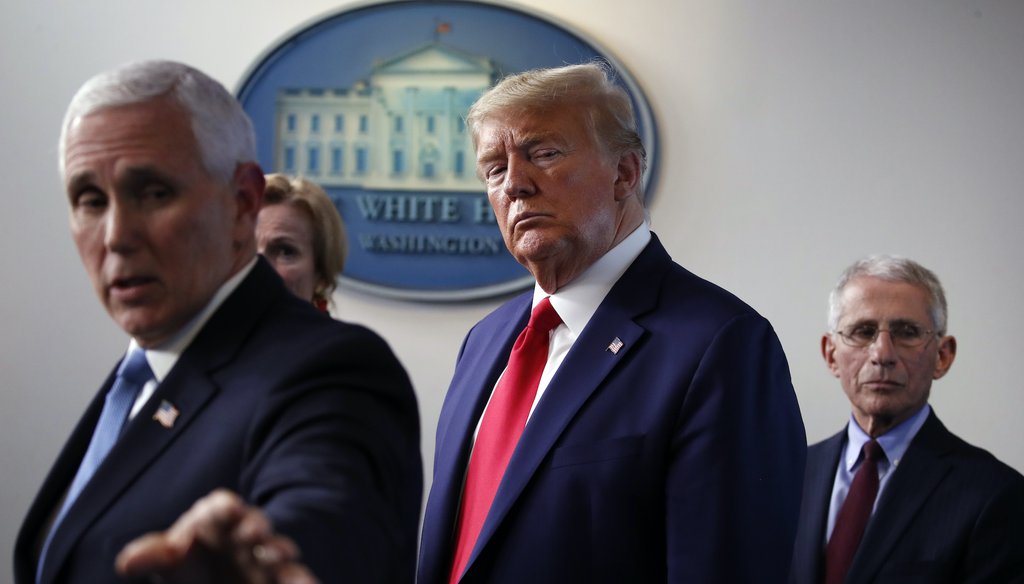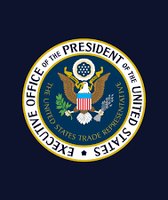Stand up for the facts!
Our only agenda is to publish the truth so you can be an informed participant in democracy.
We need your help.
I would like to contribute

Vice President Mike Pence gestures to a monitor as he speaks about the coronavirus onMarch 31, 2020, as Dr. Deborah Birx, White House coronavirus response coordinator, President Donald Trump and Dr. Anthony Fauci, director of the National Institute of All
The week in fact-checking highlights short summaries of our best work; the links will take you to our full reports.
This week: Does a mask protect the wearer, or everybody else? ... International Fact-checking Day ... No, Congress didn't give itself a raise ... Trump wrong on inheriting a broken test ... A history of federal money for pandemics
Are homemade face masks effective against COVID-19?
Since the beginning of the COVID-19 outbreak, public health officials have advised healthy Americans not to wear face masks. The reason: There’s a shortage of masks, and they should be reserved for health care workers.
But wearing a surgical mask can prevent people from infecting others — even if they aren’t showing any coronavirus symptoms. So the CDC guidance may change soon.
In the meantime, homemade masks have become so popular that online groups of avid sewers are coordinating their efforts to provide protection for health care providers.
Sign up for PolitiFact texts
Several readers asked PolitiFact about whether DIY masks are as effective at preventing the transmission of COVID-19.
Face masks do not block some of the very fine particles in the air that may be transmitted by coughs or sneezes. That means they’re not a reliable way of preventing someone from contracting the airborne coronavirus particles and getting COVID. But masks do prevent the spread of larger respiratory droplets, so they are effective at preventing an infected person from spreading the virus.
Studies show that cloth masks aren’t as good as surgical masks, but they do seem to reduce the spread of respiratory droplets.
People who have the coronavirus may not exhibit symptoms for up to 14 days after exposure, so the CDC may soon advise everyone to wear masks in public, just in case they’re sick. In that case, if you’re going out in public, wearing something is better than nothing.
Happy International Fact-checking Day!
We’re all fact-checkers now.
In these days of COVID-19, everything needs to be fact-checked. Posts on social media need fact-checking. Texts and messages from friends and family need fact-checking. The president needs fact-checking at his daily press conferences.
It's why we celebrated April 2 as International Fact-checking Day. In a message to our readers, we reflected on the importance of fact-checking and why it matters now more than ever. Read our message in its entirety.
The bottom line is this: Are we willing to use evidence, reason, science and logic to govern our actions? Or do we react on impulse and emotionally, often out of an intense flash of fear or anger? Do we use prudence and thoughtfulness to come to a decision, or do we indulge our instincts and then stick to our stance no matter what?
If you’re reading this, we hope we can put you down for the side of evidence, reason and logic. That’s what we celebrated on International Fact-checking Day.
Fact-checks of the week
Did the coronavirus stimulus give Congress a raise? No. Contrary to posts on social media, no version of the Coronavirus Aid, Relief, and Economic Security Act gave pay raises to members of Congress. We rated the claim Pants on Fire! The House and Senate are slated to receive $35 million from the stimulus. The money will go toward offsetting the costs of maintaining congressional law enforcement and child care staff, as well as improving teleworking capabilities.
Trump is wrong that New York turned down ventilators in 2015: President Donald Trump didn’t like that New York Gov. Andrew Cuomo said on TV that the federal government should help find ventilators for New Yorkers with COVID-19. "Right here, I just got this out," Trump said March 24, shuffling through papers. "This says New York Governor Cuomo rejected buying recommended 16,000 ventilators in 2015 for the pandemic, for a pandemic, established death panels and lotteries instead. So, he had a chance to buy, in 2015, 16,000 ventilators at a very low price and he turned it down." We rated that False. A 2015 New York state report said that in the case of a "severe" pandemic, the state would be short about 16,000 ventilators. But the report did not recommend buying ventilators, and did not indicate whether the state was at a position to purchase them.
Trump said he "inherited" a broken COVID-19 test: "When CDC first looked at their test, the biggest problem they had is, the test didn’t work. That wasn’t from us. That’s been there a long time. Now we have the best tests in the world." We rated that Pants on Fire. China reported a totally new viral disease, now called COVID-19, on Dec. 31, 2019. The U.S. government began sending test kits out on Feb. 5, 2020. There was no inherited test because a test couldn’t be created until the new virus had emerged.
Federal pandemic money fell for years before Trump
President Donald Trump’s critics have charged that he undermined efforts that could have helped the nation respond faster and better to the coronavirus. He’s been criticized for downgrading the focus on pandemic threats on the National Security Council and chastised for seeking budget cuts at the Centers for Disease Control and Prevention.
That isn’t the full story of U.S. pandemic preparedness.
The broader picture is that money to prepare for this day has steadily dwindled over the past 15 years — across three presidents and many sessions of Congress.
Over the years, Washington put more emphasis on fighting predictable problems, like the seasonal flu, and outright aggression in the form of chemical, biological and radiological terrorism.
As the first cases emerged in the United States, Democrats criticized Trump’s preparedness on two fronts: He eliminated a key office in the National Security Council, and he tried to cut the CDC’s budget.
The budget claims have merit. The complaints about the National Security Council are reasonable, but could be more organizational streamlining than a loss of capability.
Congress ignored the president’s budget plans and largely kept the flow of dollars steady, even increasing them slightly. Read our full story for details.
Reader question: Will the coronavirus wilt in summer heat?
As the COVID-19 pandemic rages on around the world, people are grasping for any sign that an end is in sight.
One popular ray of hope: warm weather. After all, the seasonal flu and milder strains in the coronavirus family tend to spike in winter and dwindle in spring.
Will the novel coronavirus also work that way? Experts say don’t get your hopes up.
-
While the seasonal flu typically weakens during summer months, medical experts say they don’t know if COVID-19 will behave the same way, since the strain is so new and it’s not a flu virus.
-
According to new research from Europe, high reproductive numbers of the novel coronavirus were observed in dry, cold areas as well as tropical areas with high humidity.
-
Experts warn people to not count on the weather, but say it’s possible COVID-19 infections may slow in the summer for various reasons, including built-up immunity and the results of social distancing.
Pants on Fire!
Do you smell smoke? Here's your Pants on Fire fact-check of the week:
Don’t believe hoaxes about students having to repeat their grade because schools are closed. (At least not yet.)
See what else we've rated Pants on Fire this week.
RELATED: Get the week in fact-checking early and in your inbox by signing up for PolitiFact’s free weekly email. Sign up here.
Our Sources
See links.





















































